Gin, Hens and Vaseline
By Ruth D’Alessandro, The Wildlife Gardener Being an earthy type, the Wildlife Gardener rarely gets embarrassed. But even I couldn’t help feeling slightly uneasy asking for a tub of Vaseline at my local chemist. Quite unnecessarily, I blurted out,’It’s for my hens’, and then wished I hadn’t . The assistant looked at me blankly and repeated,’For your hens?’ The words’Vaseline’ and’hens’ don’t often go together in a respectable sentence so I felt compelled to witter about rubbing Vaseline on combs and wattles to prevent frostbite.’You rub it on what?’ the assistant asked. My day was getting no better.’Comb and wattles. Those wobbly red things that hens have on the tops of their heads and dangling down under their beaks. As they are thin flesh they can get frostbitten when the weather turns icy. The way to prevent frostbite is to rub a layer of Vaseline onto these appendages, and, voilá, happy hens!”Right…’ said the assistant. I’m sure she wrapped my purchase in a brown paper bag on purpose.
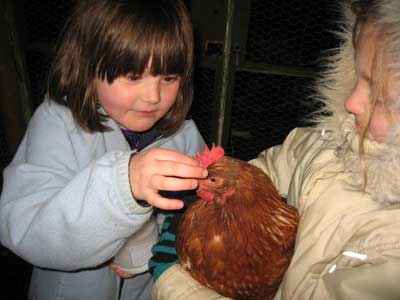
Anyway, in our little pocket of the North Downs, we’ve had driving snow, wind and temperatures of -8°C. The town was mentioned on BBC national news as being’cut off’ by snow. La famille Wildlife Gardener can snuggle round the woodburner, but what about the von Quarks in their little Foresham ark at the end of the garden when it’s blowing a blizzard that even Captain Oates would be reluctant to step out in? We took some precautions. Firstly, unembarrassed, we rubbed their combs and wattles with the aforementioned Vaseline. The wooden ark roof had been glistening with frost the day before, so I decided to make a windproof insulating blanket from a rug rescued from the tip, stapled inside some plastic sheeting that the asbestos men had left:
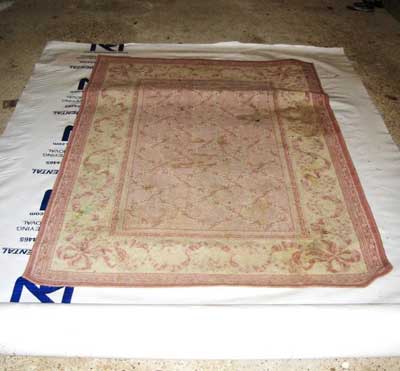
I draped this over the ark, and filled the nestboxes with lots of shredded paper, carefully removing any faeces that could make the quarters damp and dirty. That night, I watched with a heavy heart as a blizzard blew in from the north east and temperatures dropped to minus -8°C. Don’t be silly, I thought. Hens have their own built-in duvets. They snuggle together for warmth. At the farm where I buy our meat, Clare’s English Game Fowl roost in the branches of a spruce tree whatever the weather. But I have grown rather fond of our hens, and the last thing I wanted was for them to freeze to death. On Friday morning, 15cm of snow covered the Wildlife Garden and the henhouse. In trepidation, Junior Wildlife no. 1 and I went to let the hens out. Hurrah! They were alive, but deeply unimpressed with this freezing cold white stuff:
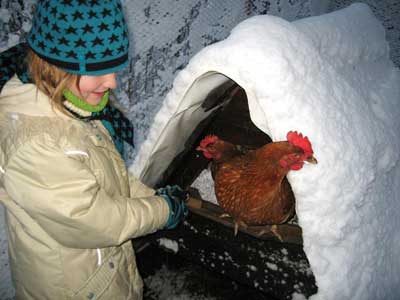
So unimpressed that they sat miserably in the hay under the ark and laid 50% fewer eggs. Instead of the usual cheerful bok-bocking, the hens were audibly moaning. With the forecast that the temperatures were going to drop further that night, I had to come up with something to keep them warm and happy, at least at night. Hmmm. I found an empty gin bottle, wrapped it in a pair of Mr WG’s old socks, filled it with hot water and placed it inside the nest box next to Mademoiselle Pompidelle:
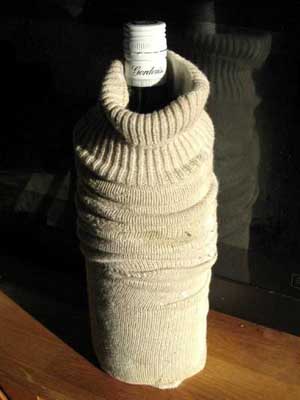
The next morning, the hens were bock-bocking again and there were four eggs in the nest box! Placing a hand inside the ark, it was noticeably warmer than the surrounding air temperature. And warmth without affecting the ventilation that’s necessary for good respiratory health in poultry housing. What spoiled creatures. So what’s in it for us, apart from superb eggs? Why, hi-tech toboggans, of course!
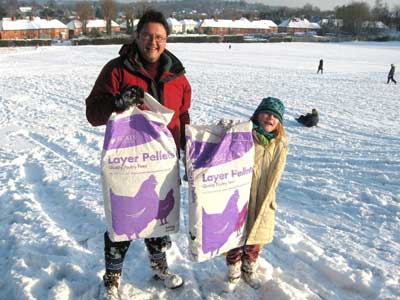
- Spurn Spawn! - 26th February, 2014
- Bluebells on wheels: axles of evil? - 2nd February, 2011
- Raising the ba: Wildlife and the Ancient Egyptian Book of the Dead - 8th January, 2011

It never occurred to me that you’d should protect chickens from the cold as I always thought their feathers provided them with all the insulation they need – sort of like a puffa jacket! Your chickens have the same disgusted look on their faces as my cats have when they encounter snow!